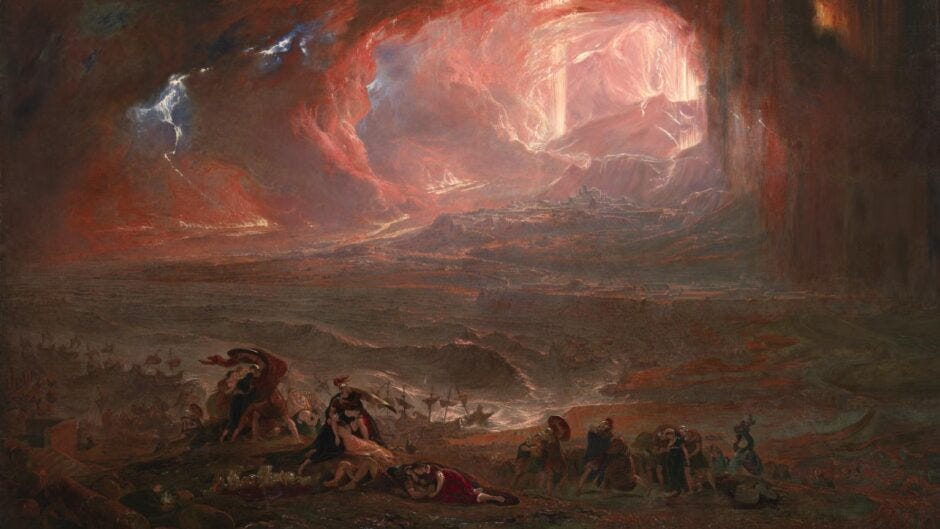Yuval Noah Harari meditates for 2 hours a day, as to not get too "blinded" by human "fictions."
Instead, he helps us "see" his "truths."
Harari is the (in)famous author of the book Sapiens, and is now releasing a book called Nexus which, I'm understanding, is a new apocalyptic book about the future of AI. I read this review in The Atlantic, which I stumbled upon thanks to Freddie deBoer.
Freddie says that Harari makes the mistake of temporal narcissism. Plenty of people have been predicting the end of days since the dawn of days, and, well, it hasn't happened yet, so… what are the chances it's now? Low, I gathered.
But, hey, it's hard to gain money and status as a public intellectual. You gotta do what you gotta do, right? If we look back in time, the most reliable way of overcoming those odds is prognosticating about the end of times. It doesn't even matter if you're wrong. Paul Ehrlich has been wrongly predicting the end of the world for decades, and he still has a thriving career.
If you want to follow in their footsteps, here's the vital first step:
You know how we've clawed ourselves out of the primal muck with thousands of years of unlikely insights yanked from the void by brave individuals? Yeah, all of that was actually bad. Forget all the ways we have made incredible strides forward economically and morally. Forget all the wonderful works of literature distributed because of the printing press, for example. Those are just "fictions" that "blind" you. Instead, focus on this "truth:" when the printing press was first invented, a great book by Copernicus sold only 500 copies, while a book about burning witches for cursing men’s penises was a bestseller. Scandalous (but not surprising)!
This anecdote works for a few reasons: 1) it affirms trendy cynicism about the past, 2) permits lazy cynicism about the future, 3) it allows the reader to justify all the great books they should read but don't, and 4) it's something you can repeat at a cocktail party. Excellent work, that.
Harari said in Sapiens, humans have "produced little that we can be proud of." Wow. Sistine Chapel? Lame. Sagrada Familia? Yawn. Uh, Apollo 11? Get a life. I mean, it's rough for our shared sense of meaning, but, who cares?
People love it. Kicking things down is much easier than building things up – and either one can make you famous. Why not do the easy one? (There's still a lot of potential energy in a carcass).
He also never cites great writers that inspired him. Just his editors and his "team." That's perfect – you don't want to be contributing to some great shared canon. You're a canon of one.
But, be careful to not throw out the baby with the bathwater. You want to diminish meaning structures so you can elevate yourself, but, unconsciously, we still crave them. So, you'll have to sneak one in.
You don't even have to directly say that you're a religious prophet (in fact, it works better if you don't). All you have to do is wrap archetypal fears of the apocalypse in some slightly poetic yet sciency-sounding wrapping paper. Boom.
Don't go to great lengths to verify what you're saying. Just use the proper lexicon and cite a few obscure historical anecdotes (like the one above), and you're good to go. It helps if you have some credentials, but you don't have to be world-class. Harari got his start by lecturing for an entry-level history course.
It doesn't matter how much people suffer from loss of meaning. That's actually an added bonus. You want to give people plenty of room to really sink their teeth into the despair that you're selling them. They will become addicted to that dread. More deeply, they will feel they need to punish themselves for their existence to please their unconscious god. For some added gallows humor, claim that the trend of history is to "trade meaning for power," and never acknowledge that you're doing exactly that.
They will lift you up as a sort of anti-savior. They will use you as a way of displaying that they are smart and also moral. Even though people claim not to be religious, we still have a very strong desire to appear moral to our social group. Harnessing that force alone will make you a killing as a doomsday prophet.
As with all doomsday prophets for all of history, actual doomsday is totally optional.
Freddie deBoer is right – it's unlikely that Harari happened to be born right before the biggest inflection point in human history. But, here's some dramatic irony for you: he was born in an unlikely moment in history; one elegantly suited to most profitably sell the story of society's collapse back to itself. In that way, Harari's lifespan is as fortuitous as his predictions seem.
Here's what we can really learn from Harari: there's an incredible amount of money to be made with doomsday predictions. All it takes is a little gumption, full-blown psychopathy, and a total disregard for the future of mankind.





Excellent takedown of the loathsome Yuval Noah Harari. He’s an incredibly shallow thinker, but a profoundly malignant human being—and as you rightly point out, a psychopath.
Like Ehrlich, he’s beneath contempt—but their lies do have to be dealt with because they are so influential—well done!
This made me chuckle. Very sharp jabs. I'll remember this the next time someone is trying to sell me on doomsday again (which will happen again and again and again and again...)